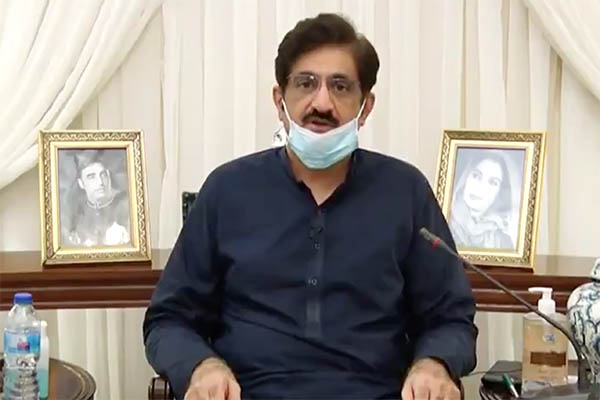
File photo. Twitter
Apart from some sectors in the ‘positive list,’ says chief minister, all other businesses are required to remain shut for next nine days
A meeting of the Coronavirus Task Force in Sindh on Friday decided to impose—from tomorrow (Saturday)—a one-week “complete” lockdown in provincial capital Karachi to curb the spread of the highly infectious Delta variant of the coronavirus that threatens to overwhelm the metropolis’ healthcare infrastructure.
“The current situation in Karachi suggests that within the next 4-5 days, the city’s hospitals will become completely full,” warned Sindh Chief Minister Murad Ali Shah in a press conference. He noted that the provincial authorities had expanded their facilities over the past year, but even these gains were proving insufficient due to the infectious nature of the Delta variant.
“This variant is very dangerous,” he stressed. “On average, an infected individual can transmit the virus to five more people,” he said, adding that the Aga Khan University Hospital had reported that it was finding all incoming cases were of the new variant.
Referring to potential criticisms from the opposition and the public over the lockdown, the chief minister said all stakeholders had been taken into confidence during the task force meeting. “Everyone who attended the task force meeting agreed that the situation is dangerous. They differed on how to respond—some wanted a total lockdown, others wanted greater emphasis on SOPs—but everyone agreed some form of intervention is required,” he said.
He further clarified that this would not be a complete lockdown. “We have compiled a ‘positive list’ of sectors that will be allowed to remain open. Everything else will remain shut,” he said and called on the public to help the government ensure it was a success.
According to Shah, the following sectors will be allowed to remain open:
- Health and medical facilities, including pharmacies
- Export-oriented industries to facilitate the national economy
- Banks, as they are answerable solely to the State Bank of Pakistan. The government will request they operate with minimal staff
- Ports to also remain open, with a similar request to operate with minimal staff
- Pakistan Stock Exchange
- Groceries, bakeries, meat and vegetable shops will be allowed to remain open till 6 p.m. daily
- Petrol pumps
- Media workers with mask compliance
- Utility companies and municipal services
- Restaurants open only for deliveries; takeaways will also remain closed
He also clarified that all board exams would be delayed a week and any scheduled for the next week would be rescheduled. To a question, he said that courts would have to determine how they wanted to proceed, adding that he hoped they would also reduce operations.
To a question, the chief minister said the government would urge private offices to remain shut, adding that intercity transport would be banned over the next week. All vaccination centers will remain open, he said, and urged the public to avail the opportunity to get inoculated.
“Lockdown is a last resort. We hope we will never have to resort to it again,” he said, adding that the government planned to proceed toward reopening from Aug. 9. “But that is only possible if, during the next 9 days, the public helps the government prevent the spread of the pandemic,” he said. “This pandemic will not end in these 9 days; we just need a break to ensure our hospitals do not get choked,” he added.
“I know this will be difficult for people, but this is very necessary not only for the city, but also the province and the entire country,” he stressed. “Please help us ensure this lockdown is a success,” he said, adding that the spread of the virus needed to be curbed and the government would also use this time to further improve hospital facilities to reduce pressure.
The chief minister also hit out at Planning Minister Asad Umar’s assertion that Sindh was reporting the lowest compliance with SOPs, alongside Balochistan, at 33 percent. “I disagree with this assertion,” he said. “All regions of the country are complying with the SOPs in the same manner; you can go and see compliance in any city of the country.”
